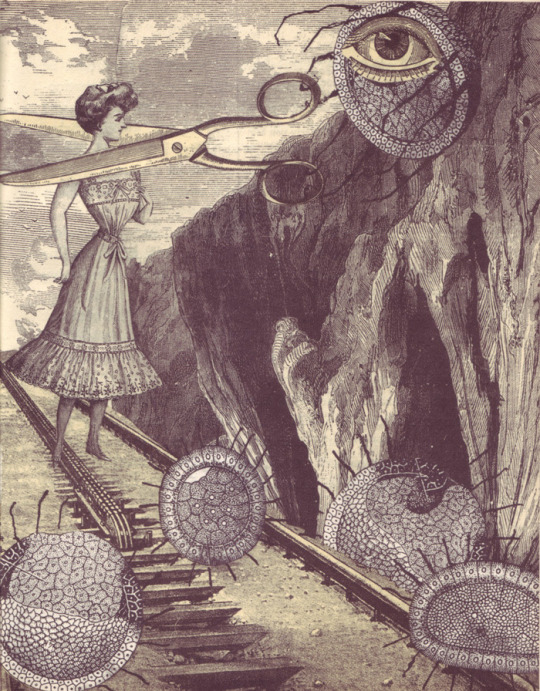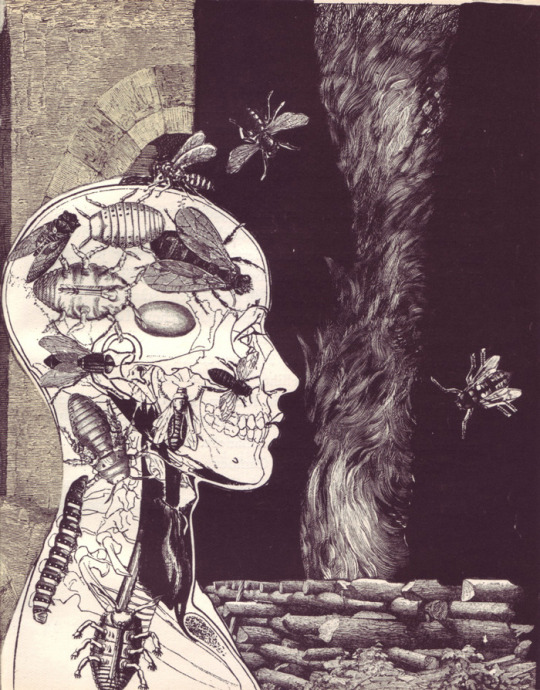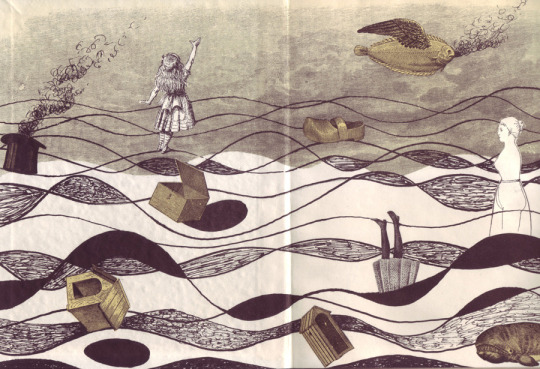#comte de lautréamont
Explore tagged Tumblr posts
Text
The unexpected, the forbidden, the mysterious, vulture-like [...] peculiarities.
— Comte de Lautréamont (Isidore Ducasse), Maldoror and Poems, transl by Paul Knight, (1988)
163 notes
·
View notes
Photo

Hans Bellmer (1902-1975)—The Songs of Maldoror [engraving, 1971]
1K notes
·
View notes
Text
A personal argument in favor of transgression in fandom spaces

Marquis de Sade (1740-1814), would he write Wincest, Reylo and Zadr fanfiction with obsessive yandere mafia boss tropes if he was alive today?
It's so weird for me to come to fandom at my current age (30) and with my background, I was not a very online teenager, I had an art tumblr growing up, but that was very far from the whole Superwholock bubble and discourse. My first interests reading were classic literature and stuff from school and Harry Potter for little bit, then Tolkien for a long time, then science-fiction and transgressive literature, starting with A Clockwork Orange, then Piano Teacher, Bret Easton Ellis, Yukio Mishima, Dennis Cooper etc. I'm a sensitive traumatized person (for reasons I won't explain) and I've been depressed and anxious most of my life, experiencing disturbing intrusive thoughts, so the themes in fiction that interested me were always the things I was most afraid and uncomfortable with in real life, traumatic events close to me that I had no other way to explore and no one else to talk to about. In a way transgressive art was always there for me, showing me how evil thoughts and experiences are not an exclusive thing, not a burden I must carry alone, those artists and writers also cared and thought about those things in meaningful ways, that was a relief. Slowly and with therapy I learned to organize my intrusive thought as creative thoughts, ideas I could use to paint or write, and this really really helped me.
The thing is I started to get interested in comic books too, this by the age of 20, reading them by myself and sharing my ideas with some close friends who didn't care about comics, but would listen to me. I started being active in fandom spaces recently, almost ten years after I started reading comics and, oh boy, is this a different environment. Where the morally ambiguous, weird and transgressive are very close to forbidden, people are divided among anti and proshippers, and exploring heavy themes and disturbing scenarios is frowned upon. I recently read about an Invader Zim artist who was bullied and had to abandon their blog due to attacks to their weird art. As if Comte de Lautréamont, Marquis de Sade, Georges Bataille and I don't know, the fucked up passages of the Bible never existed, to free us from the closed-mindness. It's all so backwards, restrictive and conservative. Not the fact that some people do not want to engage with these themes, you have the right to do so, but we accomplish nothing by judging and hating on people who want to talk about these subjects, who understand the human nature as a complex experience not imune to evil, malice, bizarre impulses and desires.
Talking about these things is different from supporting and agreeing with them, but they are a part of our existence and sometimes expressing awful experiences through art is the only escape someone have. To ignore the worst in us is a conservative attitude that idealizes a perfect conduct and ideal way of being, an hygienist perception of what it means to be human, with a lack of nuance and complexity that is just boring on top of being a form of censorship.
#real talk my fandom friends#transgressive literature#problem of evil#marquis de sade#comte de lautréamont#georges bataille#a clockwork orange#piano teacher#invader zim#obsessive mafia bosses#yandere#dennis cooper#yukio mishima#insane amount of name drops lol#comic books#but this is a serious subject#text#proship#antiship#personal#fandom#cultural critique#zadr#mental health#transgressive fiction#freak friendly#literature#little essay
44 notes
·
View notes
Text





Adolf Hoffmeister - illus. for a 1967 Czech edition of Lautreamont´s Poesies
31 notes
·
View notes
Text
“The perturbations, anxieties, depravations, deaths, exceptions in the physical or moral order, spirit of negation, brutishness, hallucinations fostered by the will, torments, destruction, confusion, tears, insatiabilities, servitudes, delving imaginations, novels, the unexpected, the forbidden, the chemical singularities of the mysterious vulture which lies in wait for the carrion of some dead illusion, precocious & abortive experiences, the darkness of the mailed bug, the terrible monomania of pride, the inoculation of deep stupor, funeral orations, desires, betrayals, tyrannies, impieties, irritations, acrimonies, aggressive insults, madness, temper, reasoned terrors, strange inquietudes which the reader would prefer not to experience , cants, nervous disorders, bleeding ordeals that drive logic at bay, exaggerations, the absence of sincerity, bores, platitudes, the somber, the lugubrious, childbirths worse than murders, passions, romancers at the Courts of Assize, tragedies,-odes, melodramas, extremes forever presented, reason hissed at with impunity, odor of hens steeped in water, nausea, frogs, devilfish, sharks, simoon of the deserts, that which is somnambulistic, squint-eyed, nocturnal, somniferous, noctambulistic, viscous, equivocal, consumptive, spasmodic, aphrodisiac, anemic, one-eyed, hermaphroditic, bastard, albino, pederast, phenomena of the aquarium, & the bearded woman, hours surfeited with gloomy discouragement, fantasies, acrimonies, monsters, demoralizing syllogisms, ordure, that which does not think like a child, desolation, the intellectual manchineel trees, perfumed cankers, stalks of the camellias, the guilt of a writer rolling down the slope of nothingness & scorning himself with joyous cries, that grind one in their imperceptible gearing, the serious spittles on inviolate maxims, vermin & their insinuating titillations, stupid prefaces like those of Cromwell, Mademoiselle de Maupin & Dumas fils, decaying, helplessness, blasphemies, suffocation, stifling, mania,--before these unclean charnel houses, which I blush to name, it is at last time to react against whatever disgusts us & bows us down.”― Lautréamont, Chants de Maldoror
#Comte de Lautréamont#Isidore Lucien Ducasse#Isidore Ducasse#quote#quotes#quotations#book quote#book#books#book quotes#quote of the night#quoteoftheday#quote of today#literature#french literature#french
9 notes
·
View notes
Text

Foreign fantasy: Gothic and Romantic eras
This chart of fantastic fiction written in languages other than English from the 1770s to the 1870s is a sort of companion to my earlier list of Gothic romances. For more titles and links to Goodreads and Wikipedia, see the full version of this list on my website.
#book recommendations#book recs#book list#gothic#gothic romance#gothic novel#horror literature#weird fiction#gothic fiction#horror fiction#fantastique#e.t.a. hoffmann#theophile gautier#honore de balzac#nikolai gogol#comte de lautréamont#jan potocki#book reccs#reading list#literature#classic books#classic literature
77 notes
·
View notes
Text
Yüreğini ıssız çöle çeviren düşünceleri bırak artık;
ateşten daha yakıcıdır onlar.
11 notes
·
View notes
Text
reviews | literature | novels | play of form
𝐓𝐞𝐧𝐝𝐞𝐫 𝐢𝐬 𝐭𝐡𝐞 𝐭𝐡𝐨𝐮𝐠𝐡𝐭 𝐨𝐟 𝐭𝐫𝐚𝐧𝐬𝐟𝐨𝐫𝐦𝐚𝐭𝐢𝐨𝐧
Lisa Samuels’ complex coming-of-age story dances the surrealist dialogue
.·:*¨༺ __________________

Les Chants de Maldoror with an illustration by René Magritte, 1948.
Sink your teeth into the soil and hold onto it. Figuratively speaking, this is exactly what Lisa Samuels’ unnamed main character does at the beginning of Tender Girl (2015). Like evolution, the novel’s story begins in the water and ends on land. And an evolution it certainly is – the evolution of a girl who is new to the sweet achings of the human world. Samuel’s thirteenth work is a coming-of-age story of the unusual kind: with a strange protagonist and stranger prose.
Tender Girl opens by washing up its leading figure on the shore of humankind. Girl, as she is simply called throughout the story, is a peculiar hybrid being – half human and half shark. For the first time, she steps out of the ocean and carefully makes her way into a strange new world. Drinking up the unfamiliar encounters with a wondrous soul, she learns to navigate the complexity of human existence and what it means to be a woman. As she grows up, Girl experiences love, and violence, and art, and grief, and motherhood, and loneliness – and the language of herself. Lisa Samuels approaches this exploration in a complex linguistic way. One which often eludes the rules of syntax and grammar, instead radically striving for a stormy stream of consciousness.
"That untranslatability being the half-slipped land-slide kind of 'person-hood' she's noticing in the other body eyes and talk she hears conveyed. How do they keep from fundamental loneliness?"
- Tender Girl (2015)
Although not expressively labeled as surrealist, Tender Girl certainly is evocative of the style: the work embodies the idea of a metamorphosis of being. Through its themes and its form – both of subversive nature – Samuels’ novel conducts a conversation with the past movement.
(Tender) Girl is the child of a well-known father: the work takes direct inspiration from Les Chants de Maldoror, a poetic novel written by the French author Comte de Lautréamont in 1869. Lautréamont’s piece approaches transgressive topics such as violence, evil, and absurdity through the actions of its misanthropic main character Maldoror. In one scene, a bizarre sequence of events climaxes when he violently mates with a shark. In the diegesis Samuel has created, her protagonist is the offspring of this brutish encounter, and Tender Girl an informal follow-up of the 19th-century tale.
Decades after its initial publication, Les Chants de Maldoror was embraced by the Surrealist movement, being hailed as a ‘proto-surrealist’ masterpiece for its subversive themes and absurd contents. Lisa Samuels expands on Lautréamont, plucking Girl from the tree of his fictional sphere and giving her a unique voice. Through this continuation, the author places her protagonist in direct relation to the avant-garde movement: both Les Chants de Maldoror and Tender Girl are explorations of transformations. Just as the source material which Girl is given birth from utilizes surrealist concepts, so, too, does Samuel’s work absorb and reform them.
"She licks her tears away from her lower face, her pink tongue on the blue of her skin. The strawberries and the tentacles are softer than anemones."
- Tender Girl (2015)
The novel’s linguistic style is an ungraspable creature, an ever-changing chimera of words. The author thrusts away any coherency of sentence structure or syntax or grammar, freeing language from the shackles of coherence. Seldomly can the reader guess how a sentence will end. Samuels’ prose is an immediate representation of the protagonist’s fluctuating feelings. While Girl shifts and changes and grows in the world she explores, the narration responds. Through this, Tender Girl holds the theme of metamorphosis in its very form.
Lisa Samuel’s novel has glistering sharp teeth, and they have sunken deeply into the soil of Surrealism. Tender Girl is an anamorphic absurdity in contemporary shape, its complex form speaking the same language as the concepts that have conceived it.
__________________ ༻¨*:·.
#surrealism#surrealist art#surrealist literature#literature#novels#prose#formalism#review#book review#tender girl#lisa samuels#les chants de maldoror#comte de lautréamont#thechimerasreviews
2 notes
·
View notes
Text
Your mind is perpetually unhinged, lured into, and trapped inside the darknesses created by the crude art of egoism and amour-propre.
— Comte de Lautréamont (Isidore Ducasse), Maldoror and Poems, transl by Paul Knight, (1988)
103 notes
·
View notes
Photo

Hans Bellmer (1902-1975) — Stairs (from The Songs of Maldoror) [etching, 1970]
230 notes
·
View notes
Text

Three editions of Les Chants de Maldoror
The English translation by Guy Wernham I found at the library of the College of the Holy Cross in Massachusetts in 2007 and bought it for 1$ (one US dollar).
The popular French edition I found on a book exchange shelf at Bochum University for free. It has a lot of scribbled notes from a previous owner which I never really made sense of.
The German edition is the only one I paid a normal price for, but I needed it to talk about the book in class.
0 notes
Text

Les Chants de Maldoror sont une œuvre complexe, dérangeante et fascinante du poète franco-uruguayen Comte de Lautréamont.
0 notes
Text
içine fırlatılmış olduğu bu çağda çırpınıp duruyordu, ama boşuna; bu çağda yeri olmadığını biliyordu, ama kurtulmasının da olanağı yoktu.
maldoror'un şarkıları, comte de lautréamont
1 note
·
View note
Photo

Isidor Ducasse Comte de Lautréamont Poésies
1 note
·
View note



